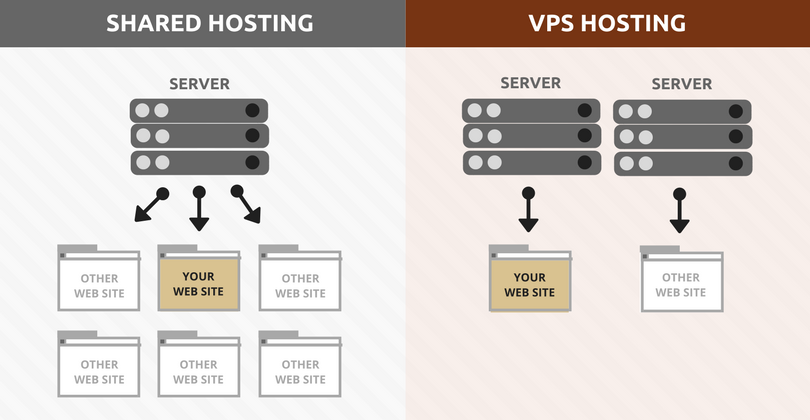Shared hosting is the smarter choice for personal projects, start-ups on a shoestring and ‘non-business critical’ web sites.
But if your livelihood depends on a WordPress website performing at a high level then a Virtual Private Server (VPS) plan is the way to go.
The shared hosting + WordPress combo has empowered millions of businesses to promote themselves and operate online, offering sophistication and flexibility that can’t be matched by alternative ‘website builder’ options such Wix and Squarespace.
The VPS option is the next step up for those that have outgrown their shared hosting and need more performance, reliability and are scalability. Let’s have a look at the pros and cons for each first:
Shared Hosting
When you sign up for a shared hosting account you’re renting an apartment in a block where you are sharing facilities with hundreds, or even thousands, of other tenants. If the lift breaks you’re all be using the stairs. If many people decide to run a bath at the same time your cold water tap will lose pressure.
On shared hosting, allocation of disk space, memory, CPU, bandwidth and disk I/O is controlled to ensure resources can’t be exceeded, so not to impact their ‘neighbours’ on the server. You will have access to a control panel – typically cPanel – to manage settings for email, databases, DNS and other functions, but you won’t be able to extend the actual resources. The bodycorp will not allow you build a third bedroom hanging off your terrace, so to speak.
Shared hosting is often under-resourced for larger websites and ones with a transactional focus, such as e-commerce. The risk is for visitors to experience the infamous ‘508 – Resource Limit Reached’ errors, even when only a handful of them are accessing the site concurrently.
How good or bad a shared hosting plan depends on how the provider has designed and set it up: the hardware, software and how resources are divvied up.
Pros
- Cheaper option
- Easy to manage
- No server admin required
Cons
- Limited, shared resources
- Can’t upgrade
- Overcrowding of servers impacts performance
VPS hosting
If shared hosting plans are apartments in a tower competing for resources, VPS are a handful of townhouses on a block of land, with each being allocated specific resource capacity.
Technically, a physical server is split into virtual servers with their own operating system that can be configured to spec. The advantages are:
- Speed – With the use of the right server side daemons (technologies such as NginX, HHVM and Varnish) you can often get far greater performance and site speed than you ever could on a shared web hosting server. Depending on the configuration, you can achieve speeds of up to 4 times as fast.
- Flexibility – You can choose the tech that best matches your requirements and configure it to spec. If you are familiar with cPanel, for example, you can install that and manage your web site as you did when on shared hosting.
- Scalability – Need more resources? More can be quickly provisioned, even on a temporary basis. This is useful for businesses that campaign hard and drive up traffic numbers significantly for short periods of time.
- Security – You can complement the security layer set by the hosting provider with additional solutions and policies.
A word of warning: Not all VPS plans are created equal. A plan may look good on paper and have an attractive price but be built on crappy tech and / or configured to squeeze in too many instances.
The superior performance will cost you more, though, for the hosting plan and time configuring and managing it. You may want to look after it yourself (the self managed option), rely on the host (opting for a fully managed server) or engage with a third party to help out.
Pros
- Superior performance
- Flexibility – configure a VPS as you require
- Scalability
Cons
- Cost
- Management
When should you upgrade from shared to VPS hosting?
 The answer is not just a technical one.
The answer is not just a technical one.
Your cPanel dashboard will highlight which features are hitting their limit, and your visitors may be experiencing slow load times and / or getting errors in the process.
40% of them may be dropping off after 3 seconds, as Kissmetrics report.
You may be able to tweak some of your settings for more bandwidth but you’ll need to find and resolve the cause of the issue: a rogue plugin, too many cron jobs or perhaps malware running in the background.
For businesses the question should be:
- How much business would you lose if your website grinds to a halt over the busy Christmas period?
- Do you have all the necessary tech and policies in place to ensure our customer data is safe?
- How badly would a slow site reflect on your brand experience?
Lost opportunities may be a much greater cost than a monthly bill for a VPS.
The answer is to plan diligently. Start off on shared hosting but plan to upgrade to a VPS when you hit both business and technical milestones.
Get some good advice and a plan
Shared hosting tech has improved tremendously over the past decade and, with the right tech, if will perform very well and suit many small to medium-sized businesses.
Hosting on a VPS is a step up when they have outgrown the shared environment and, from a performance perspective, every second counts.
Talk to your developer about this; someone who can look at your requirements now and in 12 months time, and put a plan together for you.
Feel free to get in touch with us for a free, no-obligation consultation too.


Leave A Comment